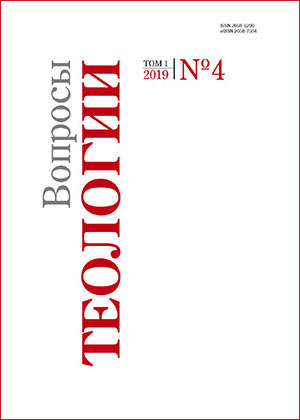Понятие совести у Филона Александрийского и апостола Павла: на примере богословско- экзегетического анализа 1 Кор 8:7–13 и других посланий
DOI:
https://doi.org/10.21638/spbu28.2019.401Аннотация
Статья посвящена экзегетическому анализу терминов лексической группы σύνοιδα / συνειδός / συνείδησις в наследии Филона Александрийского и термина συνείδησις в посланиях апостола Павла в контексте богословского осмысления понятия «совесть». Выявлен ряд различий в понимании совести апостолом и философом. Если συνείδησις у Филона используется редко и означает сознание содеянного греха, связанное с болью в человеке, и основными его терминами являются συνειδός и ἔλεγχος / ἐλέγχω, то для апостола характерно использование понятия συνείδησις. В отличие от Филона, который говорит о совести как совершенном, Богом данном феномене, апостол рассматривает совесть в антропологическом диапазоне как естественный нравственный закон, присутствующий в сознании вне зависимости от вероисповедания и обличающий или оправдывающий поступки человека. Апостол описывает случаи немощной совести как результат недостатка знания у человека о себе самом относительно других или как результат поражения грехом личности человека и, в отличие от Филона, оставляет за Господом истинный суд над человеком, не доверяя совести. Следовательно, говорить о прямой зависимости авторов друг от друга в употреблении понятия совести не приходится.
Ключевые слова:
Новый Завет, антропология, апостол Павел, совесть, инстанция, самосознание, ответственность, сильные, немощные, συνειδός, συνείδησις
Скачивания
Библиографические ссылки
References
Загрузки
Опубликован
Выпуск
Раздел
Лицензия
Статьи журнала «Вопросы теологии» находятся в открытом доступе и распространяются в соответствии с условиями Лицензионного Договора с Санкт-Петербургским государственным университетом, который бесплатно предоставляет авторам неограниченное распространение и самостоятельное архивирование.




